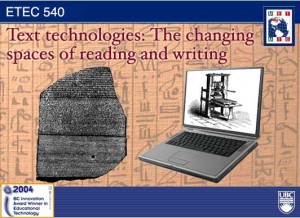ETEC 540- Text Technologies: The Changing Spaces of Reading and Writing

“This course explores how technologies for writing have changed through the course of history and how such changes have affected writing styles and genres. To understand these changes personally, students experiment with writing and creating different styles, genres and media in the process of examining the rhetorical strategies promoted by different media. In doing so, students learn how writing facilitates or hampers access to knowledge and how the information explosion has modified human understandings of what it means to be educated.” UBC, MET Program.
I started my MET journey in the fall of 2010 with ETEC 540 and ETEC 511. Another school colleague enrolled at the same time and we were in this course together. In the beginning I was very overwhelmed by learning the affordances of an online course. At times I thought that I would only go half way, but my colleague kept encouraging me by saying it is all or nothing, so think that you can do it! Good advice. Thank you Alison. We also realized that we needed to have a dictionary or use the online one to reference words and their meanings.
As the course progressed, I found myself really enjoying it. I learned about how our social structures influence and form our communications with others. I enjoyed reading “Orality and Literacy,” by Walter J. Ong. It explores writing tools from papyrus, printing machines to computers and hand held devices. I learned that technologies have been present from the beginning of human’s need to communicate.
21st century learning is redefining the way the way we teach and learn. ‘Orality and Technology’ explores the Net Generation and how various theorist like Claude Levi-Strauss’, “The Savage Mind” (1966) and Marshall McLuhan’s ,”The Medium is the Message” (1967), influence human communications, verbal and written.
I enjoyed the examination of narratives and how the analysis work of structuralist Claude Levi -Strauss (1970) compared to the textualists and deconstructionists like Michel Foucault and Jean-Jacques Rousseau who are critic-philosophers about the printed text. This lead me to re-examine the importance of narratives and the telling and/or writing of stories. I discovered that they are pivotal for understanding and examining societies.
My first indoctrination into the world of blogging was with this course in the form of a community blog. Below are a few of my blog entries. The community blog is linked to the tab of MET Journey.
I really found this course interesting and it challenged me to keep on my path of making my pearl.
LINKS TO MY ENTRIES THROUGH ETEC 540 COMMUNITY BLOG
https://blogs.ubc.ca/etec540sept10/2010/09/19/technology/
https://blogs.ubc.ca/etec540sept10/2010/10/03/orality-and-literacy/
https://blogs.ubc.ca/etec540sept10/2010/11/15/commentary-2-2/
“The nature and structure of belief systems is important from the perspective of an informational theorist because beliefs are thought to provide the cognitive foundation of an attitude. In order to change an attitude, then, it is presumably necessary to modify the information on which that attitude rests. It is generally necessary, therefore, to change a person’s beliefs, eliminate old beliefs or introduce new beliefs.”
References
Draper, A. Jonathan (2003). Orality, Literacy and Colonialism in Southern Africa. Atlanta, GA: U.S.A. library of congress Cataloguing in Publication Data: Society of Biblical Literature
Goody, Jack (2010). Myth, Ritual and the Oral. New York: Cambridge University Press:
McLuhan, M. (1964). Understanding Media, Routledge, London.
Ong, Walter. (1982.) Orality and Literacy: The Technologizing of the Word. London: Methuen.
Postman, N. (1992). Technopoly: The Surrender of Culture to Technology. New York, NY: New York.
Click on the image below to return to the MET journey page.
